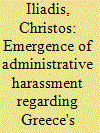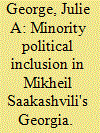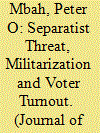| Srl | Item |
| 1 |
ID:
129469


|
|
|
|
|
| Publication |
2013.
|
| Summary/Abstract |
This article is based on official, recently declassified documents to provide an analysis of the emergence of policies of discrimination applied against the Turks of Greek Thrace. It does this by unveiling the efforts of the local authorities to construct a coherent political project that would block the expansion of Turkish nationalism among minority Muslims. After certain historical events, this project became even more exclusionary. Crucial in this direction was the establishment of a secret, official council, its operation described here. The projects it formulated and put forward were decisive for the establishment of a regime of practices of administrative harassment, applied in Greek Thrace until the early 1990s but never officially recognized
|
|
|
|
|
|
|
|
|
|
|
|
|
|
|
|
| 2 |
ID:
084752


|
|
|
|
|
| Publication |
2008.
|
| Summary/Abstract |
Georgia's Rose Revolution promised sweeping economic and political reforms, designed in part to enhance the livelihoods of ethnic and religious minority populations. The Rose events, however, occurred concomitantly with a surge in ethnic unrest. This article examines this paradox, arguing that the three major policy goals of the Saakashvili regime: the devolution of power to minorities, anti-corruption reform and state capacity building, have resulted in contradictory policy outcomes that have disproportionately hurt ethnic and religious minority enclaves.
* Thanks to APSA and ASN panel discussants Mark Beissinger and Stephen Jones and the two anonymous reviewers for their insightful comments. Many thanks to Alexander Rondeli and Temuri Yakobashvili at the Georgian Foundation for Strategic and International Studies in Tbilisi, as well as Eka Metreveli, Nana Papiashvili, Salome Tsereteli, Irakli Vacharadze, and Jeremy Teigen. Research was conducted with monetary support from the Fulbright Program and the Professional Staff Congress of the City University of New York. All errors are my own.
|
|
|
|
|
|
|
|
|
|
|
|
|
|
|
|
| 3 |
ID:
187043


|
|
|
|
|
| Summary/Abstract |
This article discusses the inclusion of Colombian women in the Havana Dialogues with FARC through the theoretical lens of political representation. It chooses representation over the vaguer notion of inclusion to further politicize this debate. Since women’s inclusion is recognized as a major achievement of the process, the article attempts to reframe the discussion by enquiring whether Colombian women were represented in the process, and, if yes, which women and how. It argues that women’s inclusion was possible due to their multilevel articulation and a reluctant and diffuse representative dynamic bringing together female negotiators, the Gender Sub-commission and women’s movements.
|
|
|
|
|
|
|
|
|
|
|
|
|
|
|
|
| 4 |
ID:
175110


|
|
|
|
|
| Summary/Abstract |
Using the qual-dominant mixed methods approach, this study analysed the impact of the separatist threat and the militarization of elections on voter turnout during the 2017 governorship election in Anambra State, Nigeria. Findings indicate that perceived and real marginalization of the Igbo in Nigeria’s state-building is largely driving the neo-Biafra separatist threat to boycott elections in Anambra State. This does not only account for the state militarization of elections in order to guarantee security; it also inadvertently engendered fear among citizens, undermined voter turnout and exacerbated political exclusion. This study concludes that inclusive political development presents an opportunity for de-escalation of separatist threats, demilitarization of elections and enhancement of voter turnout in Nigeria.
|
|
|
|
|
|
|
|
|
|
|
|
|
|
|
|